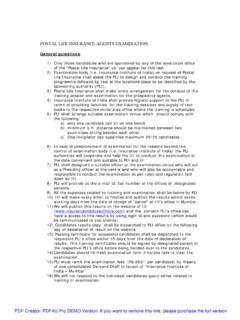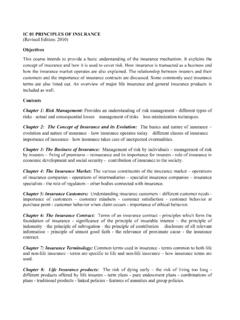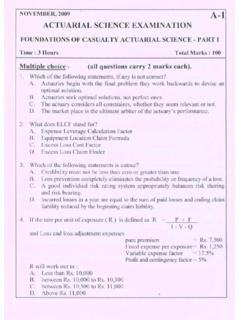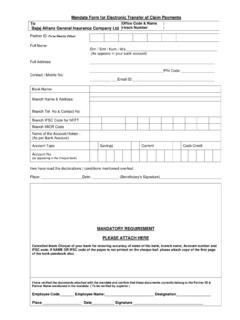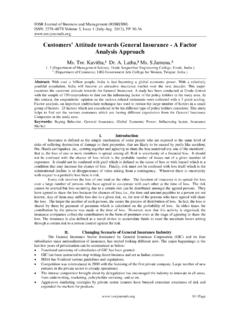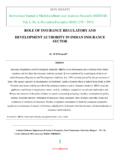Transcription of IC-38 INSURANCE AGENTS GENERAL
1 I IC-38 INSURANCE AGENTS GENERAL ACKNOWLEDGEMENT This course is based on revised syllabus prepared by INSURANCE Institute of India, Mumbai G Block, Plot No. C-46, Bandra Kurla Complex, Bandra (E), Mumbai 400 051. ii IC-38 INSURANCE AGENTS GENERAL Year of Edition: 2016 This course is the copyright of the INSURANCE Institute of India, Mumbai. In no circumstances may any part of the course be reproduced. This course is purely meant for the purpose of study of the subject by student appearing for the examination of INSURANCE Institute of India & is based on prevailing best industry practices.
2 It is not intended to give interpretation or solution in case of dispute or matters involving legal argument. This is only an indicative study material. Please note that the questions in the examination shall not be confined to this study material. Published by: P. Venugopal, Secretary- GENERAL , INSURANCE Institute of India, G- Block, Plot C-46, Bandra Kurla Complex, Bandra (E) Mumbai 400 051. iii PREFACE The Institute has developed the course material for INSURANCE AGENTS GENERAL Branch in consultation with the industry.
3 The course material is prepared based on the syllabus approved by IRDAI. The study course, thus, provides basic knowledge of Life, GENERAL and Health INSURANCE that enables AGENTS to understand and appreciate their professional career in the right perspective. Needless to say, INSURANCE business operates in a dynamic environment the AGENTS will have to keep abreast of changes in law and practice, through personal study and participation in in-house training given by insurers. We thank IRDAI for entrusting this work to III. The Institute wishes all those who study this course and pass the examination.
4 INSURANCE Institute of India iv CONTENTS Chapter no. Title Page no. SECTION 1 COMMON CHAPTERS 1 Introduction to INSURANCE 2 2 Customer Service 27 3 Grievance Redressal Mechanism 59 4 Regulatory aspects of INSURANCE AGENTS 70 5 Legal Principle of an INSURANCE Contract 79 SECTION 2 HEALTH INSURANCE 6 Introduction to Health INSURANCE 101 7 INSURANCE Documentation 117 8 Health INSURANCE Products 142 9 Health INSURANCE Underwriting 197 10 Health INSURANCE Claims 233 SECTION 3 GENERAL INSURANCE 11 Principles of INSURANCE 281 12 Documentation 315 13 Theory & Practice of Premium Rating 354 14 Personal & Retail
5 INSURANCE 378 15 Commercial INSURANCE 394 16 Claims Procedure 430 1 SECTION 1 COMMON CHAPTERS 2 CHAPTER 1 INTRODUCTION TO INSURANCE Chapter Introduction This chapter aims to introduce the basics of INSURANCE , trace its evolution and how it works. You will also learn how INSURANCE provides protection against economic losses arising as a result of unforeseen events and serves as an instrument of risk transfer. Learning Outcomes A. Life INSURANCE History and evolution B. How INSURANCE works C. Risk management techniques D.
6 INSURANCE as a tool for managing risk E. Role of INSURANCE in society 3 A. Life INSURANCE History and evolution We live in a world of uncertainty. We hear about: trains colliding; floods destroying entire communities; earthquakes that bring grief; young people dying suddenly pre-maturely Diagram 1: Events happening around us Why do these events make us anxious and afraid?
7 The reason is simple. i. Firstly these events are unpredictable. If we can anticipate and predict an event, we can prepare for it. ii. Secondly, such unpredictable and untoward events are often a cause of economic loss and grief. A community can come to the aid of individuals who are affected by such events, by having a system of sharing and mutual support. 4 The idea of INSURANCE took birth thousands of years ago. Yet, the business of INSURANCE , as we know it today, goes back to just two or three centuries. 1. History of INSURANCE INSURANCE has been known to exist in some form or other since 3000 BC.
8 Various civilisations, over the years, have practiced the concept of pooling and sharing among themselves, all the losses suffered by some members of the community. Let us take a look at some of the ways in which this concept was applied. 2. INSURANCE through the ages Babylonian Traders The Babylonian traders had agreements where they would pay additional sums to lenders, as a price for writing off of their loans, in case a shipment was lost or stolen. These were called bottomry loans . Under these agreements, the loan taken against the security of the ship or its goods had to be repaid only if and when the ship arrived safely, after the voyage, at its destination.
9 Traders from Bharuch and Surat Practices similar to Babylonian traders were prevalent among traders from Bharuch and Surat, sailing in Indian ships to Sri Lanka, Egypt and Greece. Greeks The Greeks had started benevolent societies in the late 7th century AD, to take care of the funeral and families of members who died. The Friendly Societies of England were similarly constituted. Inhabitants of Rhodes The inhabitants of Rhodes adopted a practice whereby, if some goods were lost due to jettisoning1 during distress, the owners of goods (even those who lost nothing) would bear the losses in some proportion.
10 Chinese Traders Chinese traders in ancient days would keep their goods in different boats or ships sailing over the treacherous rivers. They assumed that even if any of the boats suffered such a fate, the loss of goods would be only partial and not total. The loss could be distributed and thereby reduced. 3. Modern concepts of INSURANCE In India the principle of life INSURANCE was reflected in the institution of the joint-family system in India, which was one of the best forms of life INSURANCE down the ages.

